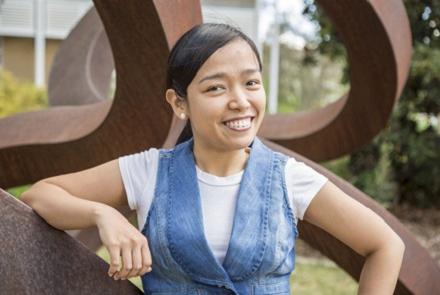
Green machine
Meet Catherine Diomampo, a former engineer and graduate of the Master of Environmental Management and Development who is going to help her home country, the Philippines, clean up its act.
Catherine Diomampo was inspired to “make an impact on the way things are done” in her hometown of Manila after seeing the way things are done elsewhere.
“My undergraduate course was chemical engineering and after graduating I went to Japan to work for a private company as a material analyst. I became more interested in the environment because living in Japan made me realise a lot of things, like Japan is very efficient with their solid waste and their environment is very clean, despite their high technology. I wanted to transfer that to the Philippines, but I knew that it wasn’t that simple, so I decided to pursue higher education in environmental management.
“I want to be helpful to other people and I know it’s a bit hard, but to do something to improve the quality of the environmental conditions in my country. We have a lot of environmental problems and the resources are being depleted. We have air quality problems, especially in Manilla, where I live, and we have solid waste management issues, and problems with water quality as well. There are a lot of things to be done.”
With that mission in mind, Catherine enrolled in the Master of Environmental Management Development at Crawford School of Public Policy. She says it was “the perfect degree” for her needs, teaching her about environmental policy and how to manage resources in the context of the developing world.
“Also, we have good teachers. They’re really professionals in the field so even if we ask a lot of tough questions, they’re able to answer them. And if they don’t know, they challenge us to find out the answers ourselves.”
When asked to name her favourite course, she says she can’t narrow it down from three.
“First, State, Society and Natural Resources. It discusses the complexity of environmental management, connecting politics, economics, social sciences, and everything into one course. It shows you the broad picture of the complex world out there, but it makes you think there’s still hope.
“I also liked Environmental Economics for the technical side. It teaches you different ways to manage resources and allows you to think about the future, for sustainability.
“Finally, Methods for Environmental Decision-Making, because it allows you to get to know the different tools that governments and policy-makers use to make decisions on environmental resource management. It’s good because you understand how decisions are made, and why, what for, and by whom.”
Catherine says coming from an engineering background, she also benefited from taking the research component of the program, which enabled her to improve her academic writing and social science research skills.
Catherine is now due to return to the Philippines, where she will look for work with the government, an international NGO or in education. She says she’ll miss Canberra when she leaves.
“I used to live in Manilla and Tokyo so I was shocked when I arrived in Canberra. I thought, ‘Where are all the people!’ But, I will miss the air quality and the very good environmental conditions, and also the fact you can see wild animals around. I think Canberra is a good place to study.”
Updated: 13 July 2024/Responsible Officer: Crawford Engagement/Page Contact: CAP Web Team













